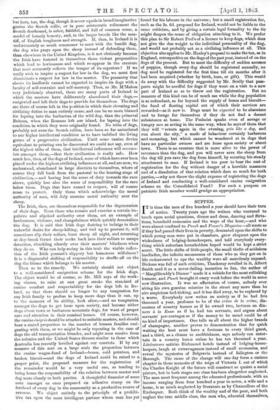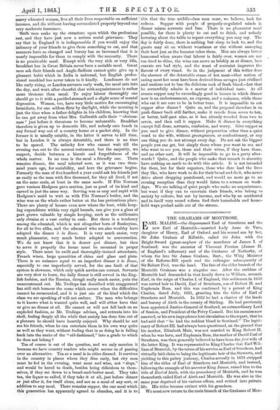SUPPER.
IT is time the men of five hundred a year should have their turn of notice. Twenty years ago the writers who ventured to touch upon social questions, dinner and dress, dancing and flirta- tions, household economies and the ways of the hour,—and who were almost confined to Punch and Fraser's Magazine—all wrote as if they had passed their lives in poverty, descanted upon the shifts to which young men were put in chambers, grew eloquent upon the wickedness of lodging-housekeepers, and told everybody every- thing which suburban householders hoped would be kept a strict secret. The little shifts of little people, the small thefts of acidulous landladies, the infinite meanuesses of those who as they got on in life endeavoured to ape the wealthy were all mercilessly exposed. Dickens was full of such criticism, Thackeray revelled in it, Albert Smith used it as a never-failing incentive to fun, the author of " Macgillicuddy's Dinner" made it a vehicle for the most rollicking humour, and Punch brought it (meg week before the world in some new illustration. It was an affectation of course, nobody ever airing his own genuine miseries in the street any more than he airs auspicious bed-ticking, and it has died away, to be replaced by a worse. Everybody now writes on society as if he had five thousand a year, professes to be of the creme de la creme, dis- courses of Country houses as if he owned two, lectures on din- ners a is Russe as if he had ten servants, and argues about servants' per-centages as if the money to be saved could be of no kind of importance. One tells us all about the higher brands of champagne, another proves to demonstration that for quick waiting the host must have a footman to every third guest, and a third, as a climax to snobbishness, says nobody can enter- tain in a country house unless he has ten thousand a year. Litterateurs satirize Richmond hotels instead of lodging-house- keepers, laugh at extravagances instead of small economies, and reveal the mysteries of Belgravia instead of Isliiagton or the Borough. The cause of the change will one day form a curious chapter in those memoirs of the reign of Victoria L out of which the Charles Knight of the future will construct so quaint a social picture, but in both stages one class has been altogether neglected. The man most frequent among the educated professionals, with an income ranging from four hundred a year to seven, a wife and a house, is as much neglected by literature as by Chancellors of the Exchequer. Both think of the wealthy and of the poor, and both neglect the true middle class, the men who, educated themselves,
marry educated women, live all their lives respectable on sufficient incomes, and die without having accumulated property beyond one very moderate insurance.
-SttElOrnen make up the structure upon which the professions rest, and they have just now a serious social grievance. They say that in England it is indispensable if you would enjoy the intimacy of your friends to give them something to eat, and that manners have so changed and luxury has so increased that it is nearly impossible for them to comply with the necessity. There is no practicable meal. Except with the very rich or very idle, breakfast has in Great Britain never been a sociable meal. Great men ask their friends and Anglo-Indians cannot quite give up a pleasant habit which in India is universal, but English profes- sional mankind has never taken to it kindly. Londoners do not like early rising, or London servants early work, the meal eats into the day, and work after cheerful chat with acquaintances is rather more tiresome than usual. To enjoy labour thoroughly one should go to it with a pacified stomach and a slight sense of mental depression. Women, too, have very little motive for encouraging breakfasts, for one seldom flirts by daylight, while the morning is just the time when a father delights in his children, knowing that he can get away from what Mrs. Galbraith calls their " obvious- ness " just before it threatens to become unbearable. Breakfast therefore is given up to domestic life, and nobody eats lunch in any formal way out of a country house or a packet ship. In the former it is usually eatable, in the latter it serves to kill time, but in London it is always detestable, and there is no time to be spared. The unlucky few who cannot wait till the evening run out to the nearest restaurant, but the majority, we suspect, decide between a biscuit and forgetfulness of the whole matter. In no case is the meal a friendly one. There remains dinner, the meal selected now, as it was two thou- sand years ago, for sociability, and here the grievance begins. Formerly the man of five hundred a year could ask his friends just as easily as the man with five thousand, for they all lived, if not on the same scale, at least in the same mode. If Fitz Norman gave venison Hodgson gave mutton, just as good of its kind and carved in just the same way. Serving was as easy- and rapid with Hodgson's maid to wait as with Fitz Norman's butler, and the wine was on the whole rather better at the less pretentious place. There are plenty of houses even now where the host, while keep- ing expenditure within very rigid bounds, can give you a glass of port grown valuable by simple keeping, such as the millionaire only obtains at a vast outlay in cash. But there is a tendency among the educated, which is not altogether born of flunkeyiSm, for all to live alike, and the educated who are also wealthy have adopted the dinner la Russe. It is very much easier, very much pleasanter, very much better adapted to conversation. We do not know that it is dearer qua dinner, but then -to serve it properly the house must be mounted in proper style. There must be swift and thoroughly-trained attendants, French wines, large quantities of china and glass and plate. There is no nuisance equal to an imperfect dinner a la Russe, especially to one imperfectly served, for the one fault of that system is slowness, which only quick service can correct. Servants are very slow to learn, the daily dinner is still served in the Eng- lish fashion, and the Russian, though really much easier, puts the unaccustomed out. Mr. Trollope has described with exaggerated but still rich humour the scene which occurs when the difficulties -cannot be surmounted, and it is just one of the kind which the .class we are speaking of will not endure. The man who belongs to it knows what is wanted quite well, and will either have that or give no dinner at all. He cannot or will not fall back on an exploded fashion, as Mr. Trollope advises, and retreats into his shell, feeling deeply all the while that society has done him out of a pleasure he should have heartily enjoyed. Why should he not see his friends, when he can entertain them in his own way quite as well as they want, without feeling that in so doing he is falling back into the ranks of the "old-fashioned," into a grade to which he does not belong ?
Tea of course is out of the question, and we only mention it because we have country readers who might accuse us of passing -over an alternative. Tea as a meal is in cities disused. It survives in the country in places where they dine early, but city men must be fed in the evening, want meat and wine, not "slops," and would be bored to death, besides being ridiculous to them- selves, if they sat down to a bread-and-butter meal. They take tea, the liquor so called, if they take it at all, just before dinner or just after it, for itself alone, and not as a meal of any sort, or addition to any meal. There remains supper, the one meal which this generation has apparently agreed to abandon, and it is to
this that the true middle-class man must, we believe, look for redress. Supper with people of properly-regulated minds is dinner minus servants and fuss. There is no pleasanter meal possible, for there is plenty to eat and to drink, and nobody hovering about the table to repeat everything you may say. The day is fairly done, there is nothing but sleep to look to, and the guests may sit on without weariness or rise without annoying their host just as the humour takes them. Men are always better humoured when aware that labour is fairly over, women are not • too tired to shine, the wine can move as briskly as at dinner, lace cravats are bad style, and the want of restraint improves the flavour of every viand. So in the judgment of this writer does the absence of the detestable steam of hot meat—that notion of eating meat hot must have been derived from savages just civilized and anxious not to lose the delicious reek of fresh blood—but that he sorrowfully admits is a matter of individual taste. At all events supper may be exceedingly good in houses in which dinner now is an embarrassment, an expense, and a nuisance, while those who eat it are sure to be in better tune. It is impossible to eat supper after dinner ? Quite so, and the proposal therefore is to push dinner back still farther, make it recede from seven to ten, or better, half-past nine, as it has already receded from two to seven, and then call it supper. Make it dinner in everything except full dress, servants, confusion, and worry. Give supper as you used to give dinner, without preparation other than a quiet word to the wife, without greengrocers, or confectionary, or any one thing you do not attempt every day. Do not ask the biggest people you can get, but simply those whom you want to see and who want to see you, those and their wives, if they have them, and no other sort. It will be impossible to go to a party after- wards? Quite, and the people who make that remark in sincerity have nothing on earth to do with this article. It is not intended for them, but for their superiors, those who dare lead the lives they like, who have work to do for their bread and do it, who never drive about dropping pasteboard, and would no more go to an evening reception than they would listen to a sermon on week- days. We are talking of quiet people who make no acquaintance, but want if they can to entertain their friends, who belong to society by culture, but not by income, and who by an accidental and in itself very sound reform find their households and house- hold ways pushed aside out of the stream.































 Previous page
Previous page